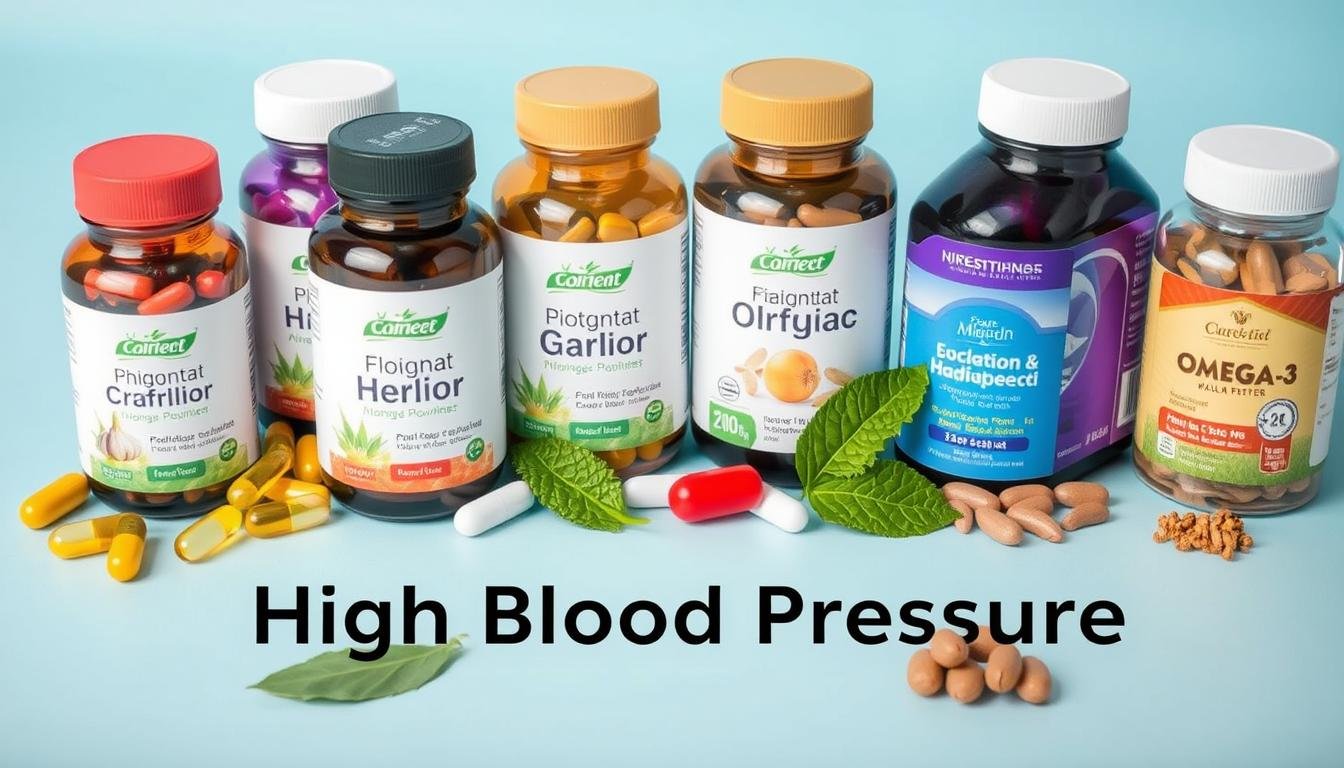“The greatest wealth is health.” – Virgil1 This saying is very true, especially for managing high blood pressure. It affects over 30% of the world’s people1. High blood pressure is a silent threat that can cause serious problems if not treated.
Many people are looking for natural ways to help with their treatment. This article looks at the top 10 supplements backed by science. They may help lower blood pressure and improve heart health.
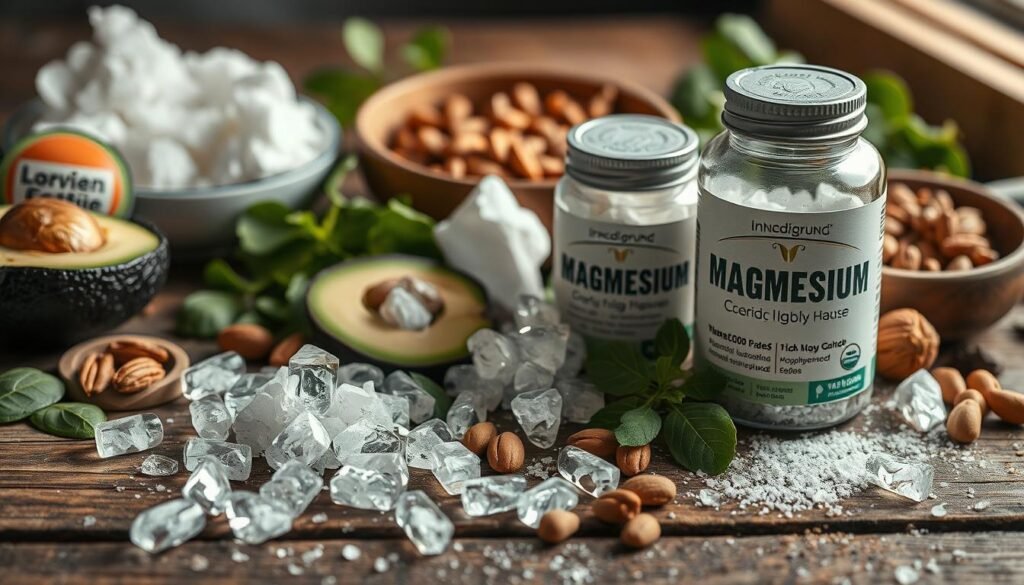 Magnesium is key for many body functions, including blood pressure4. It helps make nitric oxide, which relaxes blood vessels5. This can lower blood pressure.
Studies show magnesium supplements can reduce blood pressure5. A review of 11 studies found magnesium supplements lowered blood pressure in people with chronic conditions5. Also, eating more magnesium may prevent high blood pressure, reducing risk by 5% for every 100 mg increase4.
About 50% of U.S. adults don’t get enough magnesium6. Also, 48% of type 2 diabetes patients have low magnesium levels6.
Magnesium supplements help those with high blood pressure5. They can lower blood pressure in mild hypertension and improve medication effects in stage 1 hypertension5.
Keeping magnesium levels right is vital for blood pressure456. Adding magnesium-rich foods or supplements to your diet can help manage blood pressure. This is a key step to reduce hypertension risks.
Magnesium is key for many body functions, including blood pressure4. It helps make nitric oxide, which relaxes blood vessels5. This can lower blood pressure.
Studies show magnesium supplements can reduce blood pressure5. A review of 11 studies found magnesium supplements lowered blood pressure in people with chronic conditions5. Also, eating more magnesium may prevent high blood pressure, reducing risk by 5% for every 100 mg increase4.
About 50% of U.S. adults don’t get enough magnesium6. Also, 48% of type 2 diabetes patients have low magnesium levels6.
Magnesium supplements help those with high blood pressure5. They can lower blood pressure in mild hypertension and improve medication effects in stage 1 hypertension5.
Keeping magnesium levels right is vital for blood pressure456. Adding magnesium-rich foods or supplements to your diet can help manage blood pressure. This is a key step to reduce hypertension risks.
In conclusion, magnesium is vital for healthy blood pressure456. It boosts nitric oxide, which relaxes blood vessels and lowers blood pressure5. Adding magnesium-rich foods or supplements to your diet can help manage blood pressure and improve heart health.
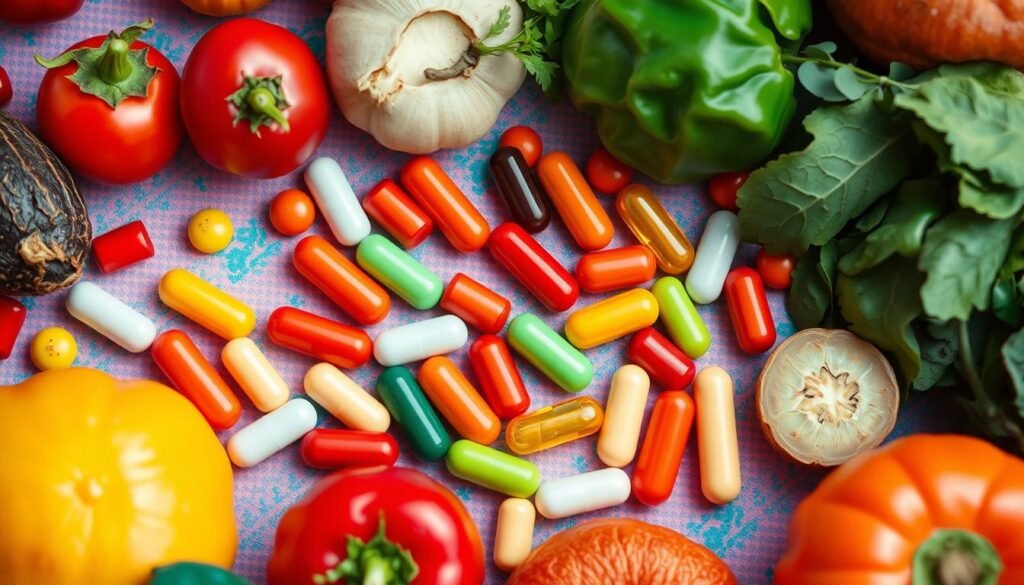 B vitamins are key in managing high blood pressure. This trio includes riboflavin (vitamin B2), folic acid and folate (vitamin B9), and vitamin B6. Studies show they can help lower and regulate blood pressure.
Vitamin B2 (riboflavin) supplements are especially helpful for those with MTHFR gene mutations. These mutations can increase the risk of high blood pressure9. Folic acid and folate (vitamin B9) have also been shown to lower blood pressure in people with heart disease. Plus, eating more folate when young may help avoid hypertension later10.
Animal studies suggest vitamin B6 supplements can reduce high blood pressure. But, there’s not enough human research yet9. Still, the B vitamin trio could be a natural way to help manage blood pressure.
B vitamins are key in managing high blood pressure. This trio includes riboflavin (vitamin B2), folic acid and folate (vitamin B9), and vitamin B6. Studies show they can help lower and regulate blood pressure.
Vitamin B2 (riboflavin) supplements are especially helpful for those with MTHFR gene mutations. These mutations can increase the risk of high blood pressure9. Folic acid and folate (vitamin B9) have also been shown to lower blood pressure in people with heart disease. Plus, eating more folate when young may help avoid hypertension later10.
Animal studies suggest vitamin B6 supplements can reduce high blood pressure. But, there’s not enough human research yet9. Still, the B vitamin trio could be a natural way to help manage blood pressure.
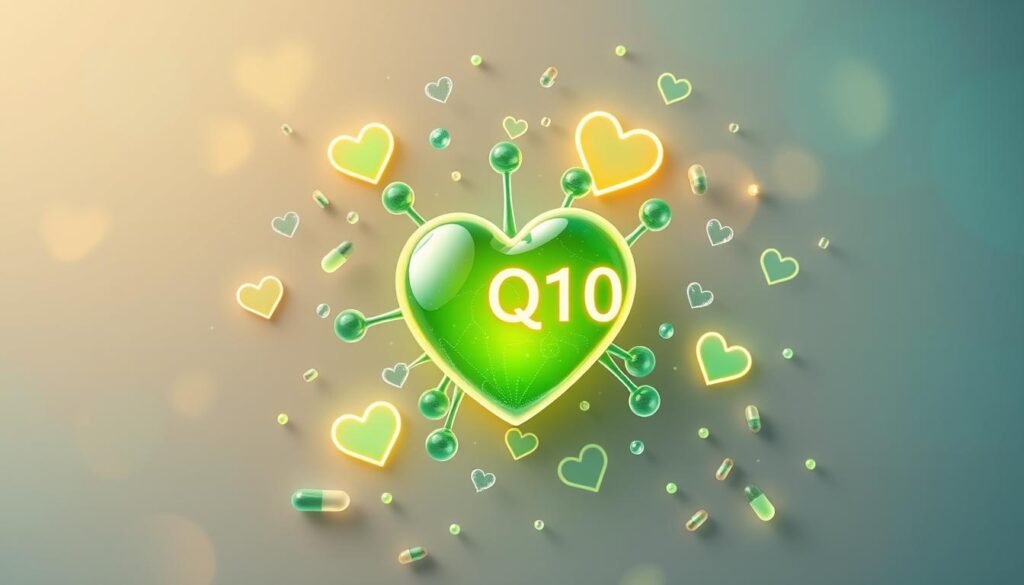 Coenzyme Q10, or CoQ10, is key for heart health and managing blood pressure. It’s made by our bodies and found in some foods13.
Many studies have looked into CoQ10’s benefits for high blood pressure. A big study with 684 people showed CoQ10 lowers systolic blood pressure. But it didn’t affect diastolic blood pressure much13.
But, CoQ10’s effects on blood pressure aren’t the same for everyone. In a study with people with type 2 diabetes, CoQ10 didn’t change blood pressure if it was already good13.
Also, taking 100 mg of CoQ10 daily for 8 weeks improved metabolic syndrome. This is a condition linked to insulin resistance and diabetes13.
CoQ10’s benefits for heart health and blood pressure have caught a lot of attention. A study in China found eating more CoQ10 lowers the risk of high blood pressure14.
Long-term use of CoQ10 and selenium also improves heart health, even years later15. CoQ10 can also boost endurance, brain function, skin, and oral health15.
Even though CoQ10 looks promising for blood pressure, more research is needed. Always talk to a doctor before taking CoQ10 or any supplement.
Coenzyme Q10, or CoQ10, is key for heart health and managing blood pressure. It’s made by our bodies and found in some foods13.
Many studies have looked into CoQ10’s benefits for high blood pressure. A big study with 684 people showed CoQ10 lowers systolic blood pressure. But it didn’t affect diastolic blood pressure much13.
But, CoQ10’s effects on blood pressure aren’t the same for everyone. In a study with people with type 2 diabetes, CoQ10 didn’t change blood pressure if it was already good13.
Also, taking 100 mg of CoQ10 daily for 8 weeks improved metabolic syndrome. This is a condition linked to insulin resistance and diabetes13.
CoQ10’s benefits for heart health and blood pressure have caught a lot of attention. A study in China found eating more CoQ10 lowers the risk of high blood pressure14.
Long-term use of CoQ10 and selenium also improves heart health, even years later15. CoQ10 can also boost endurance, brain function, skin, and oral health15.
Even though CoQ10 looks promising for blood pressure, more research is needed. Always talk to a doctor before taking CoQ10 or any supplement.
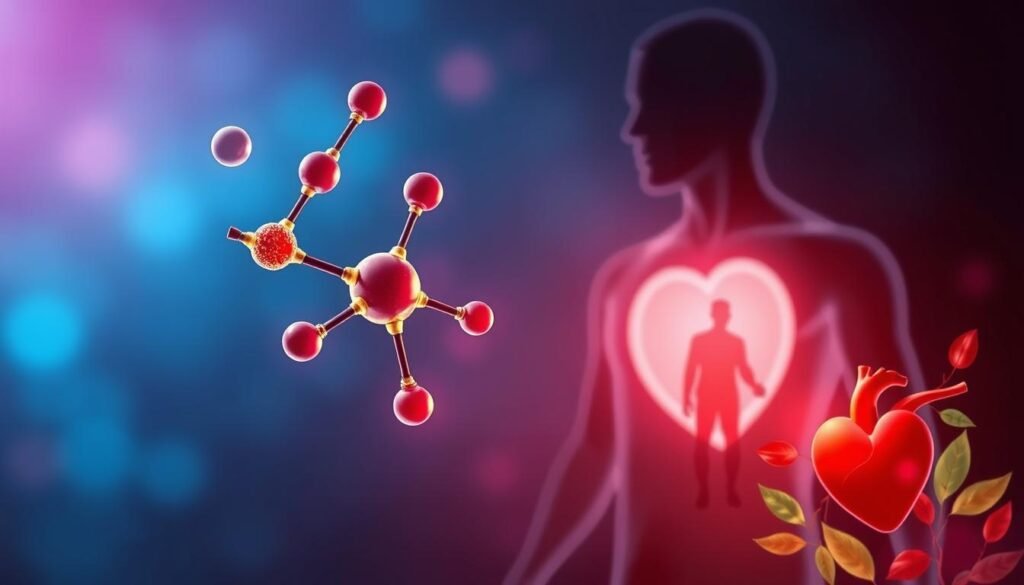 L-arginine is an amino acid that might help with high blood pressure. Studies have looked into how L-arginine supplements affect heart health. They found that it could widen blood vessels and improve blood flow161718.
An overview of 7 studies with 4,676 participants showed L-arginine lowers blood pressure. It also helps blood vessels work better and blood flow improve16.
The right amount of L-arginine is key. Taking less than 9 grams a day for a few days can lower blood pressure. L-arginine infusions also help lower blood pressure in people with hypertension17.
But, L-arginine isn’t for everyone. People with heart attacks, kidney disease, or certain conditions should avoid it18. It can also interact with some medicines, so talk to a doctor first18.
In summary, L-arginine might help keep blood pressure healthy by widening blood vessels. But, always talk to a doctor before taking any supplements161718.
L-arginine is an amino acid that might help with high blood pressure. Studies have looked into how L-arginine supplements affect heart health. They found that it could widen blood vessels and improve blood flow161718.
An overview of 7 studies with 4,676 participants showed L-arginine lowers blood pressure. It also helps blood vessels work better and blood flow improve16.
The right amount of L-arginine is key. Taking less than 9 grams a day for a few days can lower blood pressure. L-arginine infusions also help lower blood pressure in people with hypertension17.
But, L-arginine isn’t for everyone. People with heart attacks, kidney disease, or certain conditions should avoid it18. It can also interact with some medicines, so talk to a doctor first18.
In summary, L-arginine might help keep blood pressure healthy by widening blood vessels. But, always talk to a doctor before taking any supplements161718.
Adding vitamin C to your diet can be a good move if you have high blood pressure19. Always check with a doctor to see what’s best for you.
The daily omega-3 need is 1,100 mg for women and 1,600 mg for men27. Dosages can vary based on health needs28.
Key Takeaways
- Magnesium, vitamin D, and B vitamins are essential nutrients that can help regulate blood pressure.
- Potassium, CoQ10, and L-arginine supplements may dilate blood vessels and reduce overall blood pressure.
- Vitamin C, beetroot, and garlic have antioxidant and nitric oxide-boosting properties that can benefit hypertension.
- Fish oil supplements rich in omega-3s can help lower blood pressure and improve heart health.
- A holistic approach incorporating these supplements, along with lifestyle changes, can effectively manage high blood pressure.
High Blood Pressure: Top 10 researched supplements to manage it
High blood pressure, or hypertension, is a common health issue in the United States2. It affects about 1 in 3 adults. Many people look for natural ways to manage it, including supplements. This section will look at the top 10 researched supplements for lowering high blood pressure. Studies show that foods and supplements like potassium, Omega-3, and probiotics can help lower blood pressure2. The National Center for Complementary and Integrative Health (NCCIH) also suggests lifestyle changes. These include dietary modifications and exercise to manage hypertension2. Some key supplements that have been studied for their potential to manage high blood pressure include:- Hibiscus sabdariffa (in the form of tea): A 2015 review found that it could help lower blood pressure2.
- Potassium: Counters the effects of salt, eases tension in blood vessels, and can help lower blood pressure2.
- Omega-3 fatty acids: Found in oily fish, nuts, and seeds, they can help lower blood pressure2.
- Probiotics: Help maintain a healthy balance of gut bacteria and may lower blood pressure2.
- Calcium: Intake can slightly lower blood pressure, according to a 2015 review2.
Magnesium: An Essential Mineral for Blood Pressure Regulation
 Magnesium is key for many body functions, including blood pressure4. It helps make nitric oxide, which relaxes blood vessels5. This can lower blood pressure.
Studies show magnesium supplements can reduce blood pressure5. A review of 11 studies found magnesium supplements lowered blood pressure in people with chronic conditions5. Also, eating more magnesium may prevent high blood pressure, reducing risk by 5% for every 100 mg increase4.
About 50% of U.S. adults don’t get enough magnesium6. Also, 48% of type 2 diabetes patients have low magnesium levels6.
Magnesium supplements help those with high blood pressure5. They can lower blood pressure in mild hypertension and improve medication effects in stage 1 hypertension5.
Keeping magnesium levels right is vital for blood pressure456. Adding magnesium-rich foods or supplements to your diet can help manage blood pressure. This is a key step to reduce hypertension risks.
Magnesium is key for many body functions, including blood pressure4. It helps make nitric oxide, which relaxes blood vessels5. This can lower blood pressure.
Studies show magnesium supplements can reduce blood pressure5. A review of 11 studies found magnesium supplements lowered blood pressure in people with chronic conditions5. Also, eating more magnesium may prevent high blood pressure, reducing risk by 5% for every 100 mg increase4.
About 50% of U.S. adults don’t get enough magnesium6. Also, 48% of type 2 diabetes patients have low magnesium levels6.
Magnesium supplements help those with high blood pressure5. They can lower blood pressure in mild hypertension and improve medication effects in stage 1 hypertension5.
Keeping magnesium levels right is vital for blood pressure456. Adding magnesium-rich foods or supplements to your diet can help manage blood pressure. This is a key step to reduce hypertension risks.
| Magnesium Facts | Values |
|---|---|
| Adult body contains approximately magnesium | 25g, with 50% to 60% present in the bones and the rest in soft tissues4 |
| Normal serum magnesium concentrations range between | 0.75 and 0.95 millimoles (mmol)/L4 |
| Hypomagnesemia is defined as a serum magnesium level less than | 0.75 mmol/L4 |
| Typical dietary magnesium absorption by the body | 30% to 40%4 |
| Percentage of Americans ingesting less magnesium from food and beverages than recommended | 48%4 |
| Average magnesium intake for dietary supplement users | Men: 350 mg, Women: 267 mg4 |
| Average total magnesium intake with supplements included | Men: 449 mg, Women: 387 mg4 |
Vitamin D: A Potential Protector Against High Blood Pressure
Research shows that people with high blood pressure often have less vitamin D than those without7. Studies also show that more vitamin D in the blood may help fight high blood pressure7. A big study found that those with the most vitamin D had a 30% lower risk of hypertension compared to those with the least7. Vitamin D is key for keeping calcium and phosphate levels right, which is good for bones8. It also helps with inflammation, cell growth, and immune function8. This means people with high blood pressure should check their vitamin D levels and take supplements if needed7. But, a recent study found that vitamin D supplements don’t lower blood pressure for most people7. More research is needed to understand how vitamin D affects cardiovascular health. In conclusion, while there’s a link between vitamin D and hypertension, more studies are needed78. We need to learn more about how to use vitamin D supplements to manage blood pressure78.B Vitamins: A Trio of Support for Blood Pressure Health
 B vitamins are key in managing high blood pressure. This trio includes riboflavin (vitamin B2), folic acid and folate (vitamin B9), and vitamin B6. Studies show they can help lower and regulate blood pressure.
Vitamin B2 (riboflavin) supplements are especially helpful for those with MTHFR gene mutations. These mutations can increase the risk of high blood pressure9. Folic acid and folate (vitamin B9) have also been shown to lower blood pressure in people with heart disease. Plus, eating more folate when young may help avoid hypertension later10.
Animal studies suggest vitamin B6 supplements can reduce high blood pressure. But, there’s not enough human research yet9. Still, the B vitamin trio could be a natural way to help manage blood pressure.
B vitamins are key in managing high blood pressure. This trio includes riboflavin (vitamin B2), folic acid and folate (vitamin B9), and vitamin B6. Studies show they can help lower and regulate blood pressure.
Vitamin B2 (riboflavin) supplements are especially helpful for those with MTHFR gene mutations. These mutations can increase the risk of high blood pressure9. Folic acid and folate (vitamin B9) have also been shown to lower blood pressure in people with heart disease. Plus, eating more folate when young may help avoid hypertension later10.
Animal studies suggest vitamin B6 supplements can reduce high blood pressure. But, there’s not enough human research yet9. Still, the B vitamin trio could be a natural way to help manage blood pressure.
| B Vitamin | Role in Blood Pressure Health |
|---|---|
| Riboflavin (B2) | Helps lower blood pressure in those with MTHFR gene mutations |
| Folic Acid and Folate (B9) | Can reduce blood pressure in people with heart disease; higher intake in young adulthood may protect against hypertension later in life |
| Vitamin B6 | Animal studies suggest it can help lower blood pressure, but more human research is needed |
Potassium: The Powerhouse for Lowering Blood Pressure
Potassium is key for keeping blood pressure in check. Eating more potassium or taking supplements can lower high blood pressure11. It helps by getting rid of sodium and relaxing blood vessels, which lowers blood pressure11. A study of 23 trials showed potassium supplements can slightly but significantly lower blood pressure11. They are especially good for people with high blood pressure who eat a lot of sodium11. Potassium is found in many foods, making it easy to add to your diet. Broccoli, spinach, and other greens have a lot of potassium, with 3 cups of spinach giving you about 11% of your daily needs11. Bananas are also packed with potassium and are good for blood pressure and adding fiber11. Sweet potatoes have 337 mg of potassium per 100 grams and help with blood pressure and kidney function11. If you can’t get enough potassium from food, supplements can help. Coconut water is full of potassium, sodium, and magnesium, making it a natural source of electrolytes. It helps control blood pressure, improves heart health, and aids in weight management11. Pomegranates are also high in potassium, protein, vitamin C, and K. They help with heart health, blood pressure, and may support weight loss11. Adding potassium-rich foods and supplements to your daily routine can help manage high blood pressure and support heart health1112. Always talk to a healthcare professional before starting any new supplements, especially if you have health issues or are on medications12.CoQ10: Fueling Heart Health and Blood Pressure Regulation
 Coenzyme Q10, or CoQ10, is key for heart health and managing blood pressure. It’s made by our bodies and found in some foods13.
Many studies have looked into CoQ10’s benefits for high blood pressure. A big study with 684 people showed CoQ10 lowers systolic blood pressure. But it didn’t affect diastolic blood pressure much13.
But, CoQ10’s effects on blood pressure aren’t the same for everyone. In a study with people with type 2 diabetes, CoQ10 didn’t change blood pressure if it was already good13.
Also, taking 100 mg of CoQ10 daily for 8 weeks improved metabolic syndrome. This is a condition linked to insulin resistance and diabetes13.
CoQ10’s benefits for heart health and blood pressure have caught a lot of attention. A study in China found eating more CoQ10 lowers the risk of high blood pressure14.
Long-term use of CoQ10 and selenium also improves heart health, even years later15. CoQ10 can also boost endurance, brain function, skin, and oral health15.
Even though CoQ10 looks promising for blood pressure, more research is needed. Always talk to a doctor before taking CoQ10 or any supplement.
Coenzyme Q10, or CoQ10, is key for heart health and managing blood pressure. It’s made by our bodies and found in some foods13.
Many studies have looked into CoQ10’s benefits for high blood pressure. A big study with 684 people showed CoQ10 lowers systolic blood pressure. But it didn’t affect diastolic blood pressure much13.
But, CoQ10’s effects on blood pressure aren’t the same for everyone. In a study with people with type 2 diabetes, CoQ10 didn’t change blood pressure if it was already good13.
Also, taking 100 mg of CoQ10 daily for 8 weeks improved metabolic syndrome. This is a condition linked to insulin resistance and diabetes13.
CoQ10’s benefits for heart health and blood pressure have caught a lot of attention. A study in China found eating more CoQ10 lowers the risk of high blood pressure14.
Long-term use of CoQ10 and selenium also improves heart health, even years later15. CoQ10 can also boost endurance, brain function, skin, and oral health15.
Even though CoQ10 looks promising for blood pressure, more research is needed. Always talk to a doctor before taking CoQ10 or any supplement.
L-arginine: The Amino Acid That Dilates Blood Vessels
 L-arginine is an amino acid that might help with high blood pressure. Studies have looked into how L-arginine supplements affect heart health. They found that it could widen blood vessels and improve blood flow161718.
An overview of 7 studies with 4,676 participants showed L-arginine lowers blood pressure. It also helps blood vessels work better and blood flow improve16.
The right amount of L-arginine is key. Taking less than 9 grams a day for a few days can lower blood pressure. L-arginine infusions also help lower blood pressure in people with hypertension17.
But, L-arginine isn’t for everyone. People with heart attacks, kidney disease, or certain conditions should avoid it18. It can also interact with some medicines, so talk to a doctor first18.
In summary, L-arginine might help keep blood pressure healthy by widening blood vessels. But, always talk to a doctor before taking any supplements161718.
L-arginine is an amino acid that might help with high blood pressure. Studies have looked into how L-arginine supplements affect heart health. They found that it could widen blood vessels and improve blood flow161718.
An overview of 7 studies with 4,676 participants showed L-arginine lowers blood pressure. It also helps blood vessels work better and blood flow improve16.
The right amount of L-arginine is key. Taking less than 9 grams a day for a few days can lower blood pressure. L-arginine infusions also help lower blood pressure in people with hypertension17.
But, L-arginine isn’t for everyone. People with heart attacks, kidney disease, or certain conditions should avoid it18. It can also interact with some medicines, so talk to a doctor first18.
In summary, L-arginine might help keep blood pressure healthy by widening blood vessels. But, always talk to a doctor before taking any supplements161718.
Vitamin C: An Antioxidant Ally for Hypertension
Vitamin C is a water-soluble nutrient that’s key to our health. Research shows it might help manage high blood pressure1920. People with more vitamin C in their blood often have lower blood pressure than those with less. A study on young women found that those with more vitamin C had lower blood pressure19. The DASH trial also showed that eating more fruits and veggies, which are rich in vitamin C, can lower blood pressure19. Vitamin C helps keep blood vessels working right by supporting nitric oxide production19. It also fights oxidative stress, which can lead to high blood pressure21. Since many Americans have high blood pressure, adding vitamin C to your diet could help1920. But, talk to a doctor about how much to take, as it can vary for everyone.| Nutrient | Recommended Daily Intake | Median Dietary Intake | Tolerable Upper Intake Level |
|---|---|---|---|
| Vitamin C | 90 mg/day for men, 75 mg/day for women21 | 102 mg/day in the US, 72 mg/day in Canada21 | 2 g/day21 |
Beetroot: The Nitric Oxide-Boosting Superfood
Athletes often use beetroot supplements to improve their performance. This root vegetable boosts blood flow and oxygen to muscles. It does this by increasing nitric oxide levels22. A small study found that beet juice raised nitric oxide by 21% in 45 minutes22. Another study showed that 3.4 ounces of beet juice increased nitric oxide in both men and women22. Beetroot also helps with high blood pressure and hypertension. A review of 11 studies found that beetroot juice lowers blood pressure22. It’s a natural remedy for both those with and without high blood pressure. Plus, beetroot supplements cost between $12 and $40 for a month’s supply23. If you’re an athlete or someone with high blood pressure, beetroot supplements could change your life. They boost nitric oxide and may lower hypertension. This root vegetable is a true nitric oxide-boosting superfood22.| Supplement | Price | Serving Size | Features |
|---|---|---|---|
| Bulk Supplements Beet Root Powder | $10.96 | 3.5g | One-month supply, subscribe & save 5%, 30-day money-back guarantee |
| HumanN SuperBeets Sport | $40 | 10.5g | 20 servings per container, 90-day money-back guarantee, dairy-free, gluten-free, soy-free, GMO-free, includes coconut water powder |
| Horbäach Beet Root Capsules | $24.99 | 1 capsule | Convenient capsule form for on-the-go use |
Garlic: Nature’s Blood Pressure-Lowering Powerhouse
Garlic is a flavorful herb known for its health benefits. It’s especially good at helping manage high blood pressure. This makes it a great choice for anyone trying to control their blood pressure24. Research shows garlic supplements can lower blood pressure. They can reduce systolic blood pressure by 8.3 mm Hg and diastolic by 5.5 mm Hg25. This can lower the risk of heart problems by up to 40%25. Garlic’s power comes from its sulfur compounds, like allicin. These help blood vessels relax and improve blood flow24. Garlic also has antioxidants and anti-inflammatory properties, which help control blood pressure25. Adding garlic to your meals is easy. You can use it in cooking or take supplements. Garlic can help lower blood pressure and improve cholesterol. It’s a natural way to keep your heart healthy2425.Fish Oil: Omega-3s for a Healthier Heart and Blood Pressure
Fish oil is full of omega-3 fatty acids like EPA and DHA. It’s known for helping with high blood pressure and heart health26. Studies show it can lower blood pressure a bit26. It also cuts down on blood triglycerides26. Fish oil’s benefits might come from its anti-inflammatory effects and better blood vessel function27. Omega-3s can lessen heart disease severity and death risk27. But, supplements don’t help as much as eating fish does26. Fish oil might also help with dementia and bone health27. But, it can cause side effects like bad breath and nausea26. Taking too much might raise bleeding and stroke risks26. Fish oil quality varies a lot28. Nordic Naturals is a top brand for its quality and omega-3s28. Other good brands include Garden of Life and FullWell, for specific health needs28. Adding fish oil to your diet can help with blood pressure and heart health2627.| Supplement | EPA and DHA Content | Additional Nutrients | Recommended For |
|---|---|---|---|
| Nordic Naturals | 250 mg | – | General heart health |
| Garden of Life Dr. Formulated Advanced Omega | 580 mg | – | Specific health conditions |
| Sports Research Triple Strength Omega-3 | 2500 mg | 2500 IUs of vitamin D | Bone strength, inflammation, immune function |
| FullWell Fish Oil | 600 mg | – | Pregnancy |
| Needed Prenatal Omega-3+ | Algae-sourced DHA and EPA | – | Vegan pregnancy |
| Viva Naturals Triple Strength Omega-3 | 2000 mg | – | PCOS |
Conclusion: Integrating Supplements into a Holistic Approach
Many supplements can help lower high blood pressure and hypertension. But, it’s important to remember that the FDA hasn’t approved any for treating hypertension. These supplements should not replace your doctor’s prescribed medicines29. Still, these natural remedies can be a great addition to managing high blood pressure. A good plan should also include a healthy diet, regular exercise, stress management, and losing weight30. Before taking any supplement, talk to your healthcare provider. They can help find the right amount for you, based on your health and needs. By using supplements as part of a holistic approach, you can help keep your blood pressure healthy and improve your overall health3029.FAQ
What are the top 10 researched supplements for managing high blood pressure?
The top 10 supplements for managing high blood pressure include magnesium, vitamin D, and B vitamins. Potassium, CoQ10, and L-arginine are also on the list. Vitamin C, beetroot, garlic, and fish oil round out the list.
How does magnesium help lower blood pressure?
Magnesium supplements increase nitric oxide production. Nitric oxide helps relax blood vessels, which can lower blood pressure.
What is the link between vitamin D and high blood pressure?
People with high blood pressure often have less vitamin D. Higher vitamin D levels may protect against high blood pressure.
Which B vitamins are beneficial for blood pressure management?
B vitamins like riboflavin, folic acid, and folate can lower blood pressure. They are especially helpful for those with genetic factors that increase the risk of hypertension.
How does potassium help regulate blood pressure?
Potassium helps the body get rid of sodium. It also makes blood vessels relax. This can lead to a small but important drop in blood pressure, especially for those on a high-sodium diet.
What is the role of CoQ10 in managing high blood pressure?
CoQ10 supplements may lower systolic blood pressure. However, study results are mixed. More research is needed to understand its full effects on blood pressure.
How does L-arginine help lower blood pressure?
L-arginine supplements improve blood vessel function and blood flow. This can help lower blood pressure levels.
Can vitamin C supplements help reduce high blood pressure?
Study results on vitamin C supplements are mixed. Recent research suggests they may lower blood pressure, especially in those with low levels of vitamin C.
How do beetroot supplements affect blood pressure?
Beetroot supplements can lower blood pressure in both people with and without high blood pressure. They improve blood flow and oxygen delivery.
What are the blood pressure-lowering benefits of garlic supplements?
Garlic supplements can reduce both systolic and diastolic blood pressure. This may lower the risk of stroke, heart attack, and coronary artery disease.
How can fish oil supplements help manage high blood pressure?
Fish oil supplements with omega-3 fatty acids EPA and DHA can significantly lower systolic and diastolic blood pressure in people with hypertension.
Source Links
- https://www.healthline.com/nutrition/supplements-lower-blood-pressure
- https://www.medicalnewstoday.com/articles/supplements-to-lower-blood-pressure
- https://www.mayoclinic.org/diseases-conditions/high-blood-pressure/in-depth/blood-pressure/art-20045245
- https://ods.od.nih.gov/factsheets/Magnesium-HealthProfessional/
- https://www.ncbi.nlm.nih.gov/pmc/articles/PMC8108907/
- https://www.healthline.com/nutrition/magnesium-benefits
- https://www.cdc.gov/pcd/issues/2020/19_0307.htm
- https://ods.od.nih.gov/factsheets/VitaminD-HealthProfessional/
- https://www.keystonerx.com/blog/best-supplements-for-energy
- https://www.ncbi.nlm.nih.gov/pmc/articles/PMC4290459/
- https://timesofindia.indiatimes.com/life-style/health-fitness/diet/6-potassium-rich-foods-to-control-blood-pressure/articleshow/113299365.cms
- https://www.verywellhealth.com/herbs-and-supplements-to-naturally-lower-blood-pressure-6466120
- https://www.mdpi.com/2076-3921/9/4/341
- https://www.mdpi.com/2072-6643/16/15/2478
- https://globalhealing.com/blogs/education/coq10?srsltid=AfmBOoppSAzsyLmCeVwzOv8BsC7HTR_8bT9LnbEA3Sr8NmhV0xfz4Nfs
- https://www.webmd.com/vitamins/ai/ingredientmono-875/l-arginine
- https://www.mayoclinic.org/drugs-supplements-l-arginine/art-20364681
- https://www.mayoclinic.org/diseases-conditions/high-blood-pressure/expert-answers/l-arginine/faq-20058052
- https://www.ncbi.nlm.nih.gov/pmc/articles/PMC2621233/
- https://lpi.oregonstate.edu/mic/vitamins/vitamin-C
- https://www.ncbi.nlm.nih.gov/books/NBK225480/
- https://www.healthline.com/nutrition/nitric-oxide-foods
- https://www.innerbody.com/best-beet-supplement
- https://www.wackof.com/post/the-health-benefits-of-garlic
- https://medium.com/@msa.sid/the-potent-health-benefits-of-garlic-natures-medicinal-marvel-323c397e9176
- https://www.mayoclinic.org/drugs-supplements-fish-oil/art-20364810
- https://www.healthline.com/nutrition/benefits-of-fish-oil
- https://www.health.com/best-fish-oil-supplements-7643799
- https://www.ncbi.nlm.nih.gov/pmc/articles/PMC10574336/
- https://www.healthline.com/nutrition/herbs-to-lower-blood-pressure

